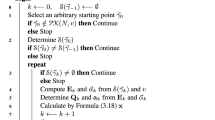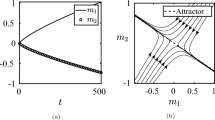Abstract
Standard solution concepts, like subgame perfection, implicitly require that players will continue to assume everybody is rational even if this has been revealed to be false by virtue of having reached a node that could not have been reached had all players behaved rationally. Several attempts have been made in the literature to solve this problem. The present paper shows that the problem is insoluble.
Similar content being viewed by others
References
Abreu D, Pearce DG (1984) On the Inconsistency of Certain Axioms on Solution Concepts for Non-Cooperative Games, Journal of Economic Theory, vol. 34, 169–74
Basu K (1987) Modeling Finitely-Repeated Games with Uncertain Termination, Economics Letters, vol. 23, 147–51
Basu K (1988) Strategic Irrationality in Extensive Games, Mathematical Social Sciences, vol. 15, 247–60
Bernheim D (1984) Rationalizable Strategic Behaviour, Econometrica, vol. 52, 1007–28
Binmore K (1987) Modelling Rational Players, Economics and Philosophy, vol. 3, 179–214
Cho I (1987) A Refinement of Sequential Equilibrium, Econometrica, vol. 55, 1367–89
Dekel E, Fudenberg D (1987) Rational Behaviour with Payoff Uncertainty, Working Paper, M.I.T., Cambridge, Massachusetts
Kreps DM, Milgrom P, Roberts J, and Wilson R (1982) Rational Cooperation in the Finitelyrepeated Prisoner's Dilemma, Journal of Economic Theory, vol. 27, 245–52
Kreps DM, Ramey G (1987) Structural Consistency, Consistency, and Sequential Rationality, Econometrica, vol. 55, 1331–48
Kreps DM, Wilson R (1982) Sequential Equilibria, Econometrica, vol. 50, 863–94
Neyman A (1985) Bounded Complexity Justifies Cooperation in the Finitely Repeated Prisoner's Dilemma, Economics Letters, vol. 19, 227–29
Pearce DG (1984) Rationalizable Strategic Behaviour and the Problem of Perfection, Econometrica, vol. 52, 1029–50
Reny P (1986) Rationality, Common Knowledge and the Theory of Games, Ph. D. dissertation, Princeton University
Rosenthal RW (1981) Games of Perfect Information, Predatory Pricing and the Chain Store Paradox, Journal of Economic Theory, vol. 25, 92–100
Rubinstein A (1986) Finite Automata Play the Repeated Prisoner's Dilemma, Journal of Economic Theory, vol. 39, 83–96
Selten R (1975) Reexamination of the Perfectness Concept for Equilibrium Points in Extensive Games, International Journal of Game Theory, vol. 4, 25–55
Selten R (1978) The Chain-store Paradox, Theory and Decision, vol. 9, 127–59
Author information
Authors and Affiliations
Rights and permissions
About this article
Cite this article
Basu, K. On the non-existence of a rationality definition for extensive games. Int J Game Theory 19, 33–44 (1990). https://doi.org/10.1007/BF01753706
Received:
Revised:
Accepted:
Issue Date:
DOI: https://doi.org/10.1007/BF01753706




